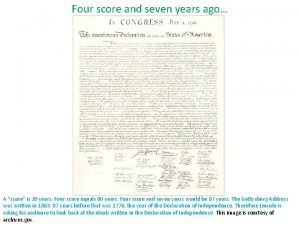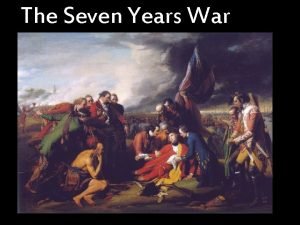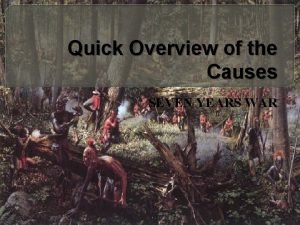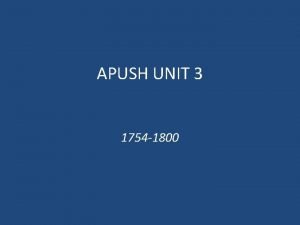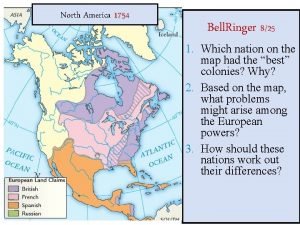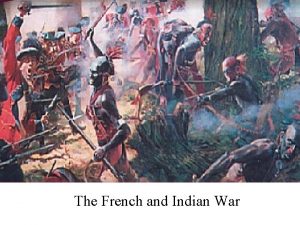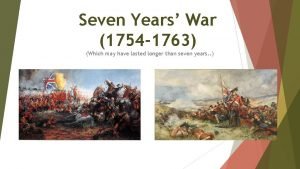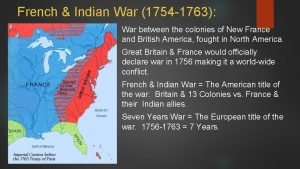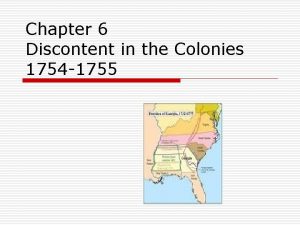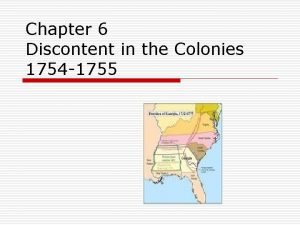The Seven Years War 1754 1763 Overview 1755














- Slides: 14

The Seven Years War 1754 -1763

Overview • 1755 - Deportation of the Acadians by British soldiers. Acadians forced to the 13 colonies and Louisiana. • 1756 - Seven Years War is formally declared. The French and British fought to control the Atlantic and the colony of Quebec. • 1758 - Capture of Louisbourg (French military fort) • 1759 - Battle of the Plains of Abraham • 1760 - Battle of Sainte-Foy • 1760 - Capture of Montreal • 1763 - Treaty of Paris is signed (France surrenders New France)

North America in 1750

Seven Years’ War Causes: - The struggle to control the fur trade territory (west to the Rocky Mountains and in the Ohio Valley. ) - The struggle to control the Atlantic (with its rich fishing areas and strategic location). - England had established thirteen colonies along the Atlantic coast. As more and more English colonists arrived, the pressure to expand British territory into the western lands occupied by the French increased. - French and British sought alliances with Indians ( the French were more successful. ) Early British Defeats: – British defeated in battle at Fort Oswego on Lake Ontario in 1756. – British defeated in battle at Fort William Henry on Lake George in 1757. – British defeated in battle at Fort Ticonderoga on Lake Champlain in 1758.

The Deportation of the Acadians • The British government demanded that Acadians take an oath of allegiance to the Crown that included fighting against the French. Most of them refused – wanting to be neutral. • British Governor Charles Lawrence and the Nova Scotia Council decided on July 28, 1755 to deport the Acadians. • About 6, 000 Acadians were forcibly removed from their colonies. The British military ordered the Acadians' communities to be destroyed and homes and barns were burned down. • Acadians were deported. They were shipped to many points around the Atlantic. Large numbers were landed in the English colonies, others in France or the Caribbean. Thousands died of disease or starvation in the squalid conditions onboard ships.

The Capture of Louisbourg • Louisbourg flourished as a naval base, fishing port, and commercial centre until 1758. In that year, 13, 000 British soldiers and a massive fleet attacked the fortified city and overwhelmed 4, 000 French defenders. • The British needed to capture Louisbourg on Île Royale (now Cape Breton Island), in order to gain control of the entrance to the Saint Lawrence River. By capturing Louisbourg, the British could sail down the river to attack Quebec. • The British bombed the French fortress from ships. After fighting for almost 60 days, the British landed on the high ground overlooking Louisbourg and bombarded the fortress. The French were forced to surrender.

The Battle of Montmorency • British Major-General, James Wolfe, led a fleet of 200 ships, 9000 soldiers and 18, 000 sailors up the Saint Lawrence River to bombard Quebec from the water. • French Commander, Marquis de Montcalm was stationed in a fortress in Quebec with 16, 000 troops. • For three months, the French were able to fight off the British attacks on Quebec. • On July 31 st, 1759, near the falls at Montmorency, Wolfe launches the invasion of Quebec. But, the French troops and the Canadian militia crush the British invasion.

The Battle of the Plains of Abraham • Wolfe decided to land at L’Anse-au-Foulon, about three km upstream from Québec City. He and his troops climbed steep cliffs under the cover of darkness and assembled on a flat field, known as the Plains of Abraham. • 4441 British troops were on the plains and caught Montcalm by surprise. • During the battle, Wolfe was struck by a fatal shot in the chest. Montcalm was wounded by a musket ball that him below his ribs (and he died the next day. ) • The British destroyed the army of French regulars, Canadian militia, and First Peoples warriors and forced them to retreat to Montreal. • The British capture Quebec.

The Battle of Sainte-Foy • The British occupied Quebec over the winter, but in the spring, the French marched back to Quebec under the command of Francois Gaston de Levis with the intent to drive the British out. • On April 28 th 1760, Lévis’ French army defeated the British army (led by General James Murray) at the Battle of Sainte-Foy, just west of the city. In a reversal of events from the previous year, the British retreated to Québec, and the French laid siege. • On May 16 th, Levis had to abandon the siege and retreat to Montreal when British frigates arrived in the St. Lawrence River. All hopes of the French receiving reinforcements were dashed.

The Capture of Montreal • Over 18, 000 British men invaded Canada by three waterways: Murray's army and his 3, 800 men came up the St. Lawrence River from Québec, 3, 400 soldiers led by Haviland arrived by the Richelieu River, and finally Amherst and his 11, 000 men came by the St. Lawrence from Lake Ontario. • On September 8, 1760, almost a year to the day after the French troops were defeated on the Plains of Abraham, the French forces at Montreal surrendered to the British.

The Treaty of Paris • The Treaty of Paris was signed on February 10 th, 1763. It ended The Seven Years War between Great Britain and France, as well as their respective allies. • By the terms of the treaty, Britain obtained the French possessions of Ile Royale (Cape Breton Island), Canada (Quebec), and the Great Lakes Basin and the east bank of the Mississippi River. Britain received Florida from Spain. • France retained fishing rights in Newfoundland the Gulf of St Lawrence, and acquired the small Gulf islands of Saint Pierre and Miquelon as unfortified fishing bases.

Consequences of the war First Peoples: As the French surrender, First Peoples form new alliances with the British. They are independent powers, free to negotiate to protect their interests. When the British fail to live up to their obligations as allies, the Great Lakes First Peoples begin a new war against the British in 1763. The British respond with the Royal Proclamation, a step towards the acknowledgment of Aboriginal Title by the Crown. Canada: The Conquest made Canada a British colony with British institutions, including parliamentary government and the monarchy, and a dominant Anglophone population. Most English-speaking Canadians thought of themselves as British until after the Second World War. Their strong identification with Britain led to Canada's participation in the First and Second World Wars.

Consequences of the war French Canadians: The conquest was a catastrophe for French Canadians. Canada was ripped away from France and turned into a small province in Britain's North American Empire. But if New France had vanished, French Canada survived. Canadiens produced new leaders like Louis-Hippolyte La Fontaine and George-Etienne Cartier. They used British parliamentary institutions and alliances with English-speaking reformers to preserve the French language and culture. The United States of America: For Americans, the Seven Years' War was a triumph that set them on the road to independence. With the French threat eliminated, the American colonies no longer needed British protection. Angry at British attempts to control the colonies and collect taxes, many Americans rebel in

North America in 1763
 Conclusion of earthquake
Conclusion of earthquake Four score and ten years ago
Four score and ten years ago What caused the seven years war
What caused the seven years war 7 years war apush
7 years war apush What caused the seven years war
What caused the seven years war What caused the seven years war
What caused the seven years war Seven years war
Seven years war Eylf meaning
Eylf meaning 1754 to 1800 apush
1754 to 1800 apush North america 1754 map
North america 1754 map Prewar boundaries 1754
Prewar boundaries 1754 1754 lulu love
1754 lulu love 300 solar years to lunar years
300 solar years to lunar years Sheep years to human years
Sheep years to human years Last seven years
Last seven years

